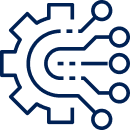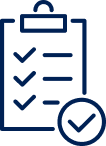MANAGEMENT SYSTEMS
Solidity, responsibility, sustainability, innovation, internationality, awareness and people are the values that have always guided our commitment to all company processes.
At HITECO with the implementation of the Integrated Safety and Environment Management System and the Quality Management System, we consider the protection of the health and safety of workers, full respect for the environment and the continuous search for the satisfaction of customer needs, as priorities and essential principles of our governance.
The management systems rotates around three pillars: products/services, people and processes

PRODUCTS/SERVICES - The company innovates and develops sustainability, guaranteeing the safety of users, complying with standards and aiming at providing the customer with excellence in performance and quality. The quality of the products is guaranteed through checks on components and finished products, through process, strength of problem solving and prevention of anomalies. The quality of the services improves continually thanks to the development of the skills and the support of digital tools.

PEOPLE - People are the key element; this is why the Group invests in its own Campus and training, in general, and develops skills and promotes talent. Focus on results, initiatives and teamwork are rewarded. Each employee can and must contribute to the continuous improvement of the quality system, feeling involved and empowered.

PROCESSES - The company processes are in line with procedures, practises and structural methods. The digitalisation of the processes allows for an effective and efficient growth, constantly monitored with performance and activity indicators. At the centre of the system are people who implement the processes, from the offer stage to the sale, from design to procurement and production right up to Customer Care.
Improvement
The management systems improvement is achieved by:
- setting increasingly more challenging company objectives
- constantly controlling performances by monitoring indicators, auditing, checks and reviews
- implementation of a circular strategy for which projects and activities follow a logic of analysis/implementation/checks/improvement
- assessment and management of risk factors.
